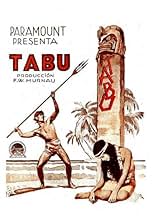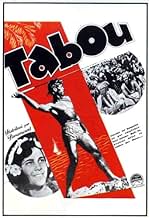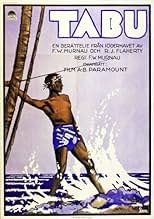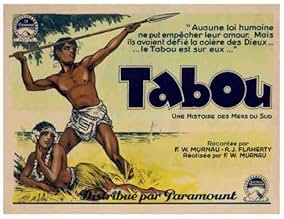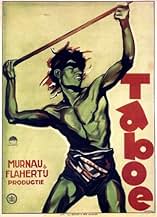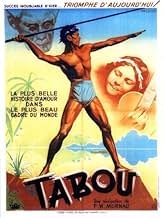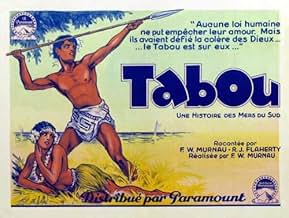Na ilha de Bora Bora, no Pacífico Sul, o amor de um jovem casal é ameaçado quando o chefe tribal declara a menina como virgem sagrada.Na ilha de Bora Bora, no Pacífico Sul, o amor de um jovem casal é ameaçado quando o chefe tribal declara a menina como virgem sagrada.Na ilha de Bora Bora, no Pacífico Sul, o amor de um jovem casal é ameaçado quando o chefe tribal declara a menina como virgem sagrada.
- Direção
- Roteiristas
- Artistas
- Ganhou 1 Oscar
- 4 vitórias no total
- The Girl
- (as Reri)
- The Policeman
- (as Jean)
- The Businessman
- (não creditado)
- The Captain
- (não creditado)
- Boys Friend
- (não creditado)
- Direção
- Roteiristas
- Elenco e equipe completos
- Produção, bilheteria e muito mais no IMDbPro
Avaliações em destaque
Although no members of the cast were professional actors, the performances by Matahi (as a young pearl fisherman) and Reri (as the `tabu' island girl) are moving. More than 70 years after its release, `Tabu' remains essential viewing, and UCLA's restoration of this classic has been a highlight of the schedule of new DVD releases in 2002. In fact, the film's luxurious black-and-white cinematography garnered cameraman Floyd Crosby an Oscar. DVD extras include audio commentary by UCLA Film Professor Janet Bergstrom; outtake footage; theatrical trailer; still gallery; short film titled `Reri in New York.'
The best spear-fisherman on Bora Bora is a handsome young man billed simply as The Boy (Matahi). His legendary status and unparalleled skill makes him popular amongst the islanders, and soon he has caught the eye of The Girl (Reri - who went on to star on Broadway as Anne Chevalier). They romance each other, but their affair is soon halted by the arrival of emissary The Old Warrior (Hitu), who proclaims Reri as the sacred maiden. She is 'tabu', and cannot be looked upon by any man unless he wishes the punishment of death. The couple brave storm and sea to escape, an arrive in a French-colonised island, where Matahi start work as a pearl diver. But their happiness is fleeting, and Reri is soon haunted by the image of Hitu, terrified she may have angered the gods.
The plot is hardly anything new, but Floyd Crosby's Oscar-winning cinematography makes Tabu more socially aware that the film may have you believe. The subtle yet crucial involvement of the French colonists, finding amusement at Matahi's lack of understanding regarding money and material wealth, is a clear swipe at the creeping of Western civilisation. Bora Bora won't stay pure for much longer. And that adds a gravitas to Matahi and Reri's plight - not only is their romance doomed, but so are their traditions and society. It is one of the last great silent films, a reminder that sound can be an unnecessary distraction, and that picture's can sometimes genuinely speak louder than words.
www.the-wrath-of-blog.blogspot.com
The story is simple and direct. It's both a love story and a visual documentary that will appeal to Westerners accustomed to a more tech lifestyle. Parts of the narrative are conveyed by means of the writings in a ship captain's log. The writing is displayed on the screen, for viewers to read. The film's tone varies from light and cheerful at the beginning to more somber as the plot moves along.
Shot in Tahiti and Bora Bora, the film has a cast made up entirely of non-professionals. The B&W lighting is good, given the early era.
The film is one of the last of the silent period. And I'm therefore reluctant to find fault with it. The native Pacific music is really beautiful, what there is of it. I could have wished for a lot more. By contrast, the imported symphonic score is loud, nondescript, and intrusive. I guess that would be the one thing I would have changed.
Even for viewers who don't care for silent films, "Tabu: A Story Of The South Seas" might be appreciated for its documentary style visuals. For viewers familiar with silent cinema, this is a must-watch film, Director F.W. Murnau's last.
This one has one thing distinguishing itself from the others - the cast is all actually Polynesian, or partly so (sorry Dorothy). It does bring in the common troubles of indigenous peoples: wanting to escape their stifling tribal atmosphere, they have a hard time coping with the outside world's currency economy and alcoholic drink. The movie eschews the Hollywood ending. Anne Chevalier is a treat, and a climatic moment late in the movie is directed for maximum shock.
Você sabia?
- CuriosidadesProducer/director/co-writer F.W. Murnau died in a car accident a few days after starting work on the music for this film. It had its New York premiere a week later.
- Citações
The Girl: [writing a goodbye letter] I must go. Hitu is here and waits for me. You will die if I do not obey. I will go so that you may live. The tabu is upon us. I have been so happy with you far more than I deserved. The love you have given me, I will keep to the last beat of my heart. Across the great waters, I will come to you in your dreams when the moon spreads its path on the sea. Farewell.
- ConexõesEdited into Caça nos Mares do Sul (1940)
Principais escolhas
- How long is Tabu: A Story of the South Seas?Fornecido pela Alexa
Detalhes
- Data de lançamento
- País de origem
- Idioma
- Também conhecido como
- Tabu - Priča sa Južnih mora
- Locações de filme
- Empresa de produção
- Consulte mais créditos da empresa na IMDbPro
Bilheteria
- Orçamento
- US$ 150.000 (estimativa)
- Tempo de duração
- 1 h 26 min(86 min)
- Mixagem de som


